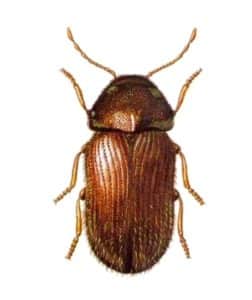Beetle Control Services
Beetle control is highly sought-after, thanks to there being over 25,000 different beetle species. While most beetles do not cause any issues for home or property owners there are a few species, like carpet beetles, that can be a nuisance. Our pest control service typically prevents these issues, but whether you are dealing with a beetle infestation or find a few in your basement give us a call!
To easily identify the insect as a beetle, they have well-developed antennae and chewing mouthparts, as well as shell-like front wings. The wings are durable and waterproof, serving as protection against damage and dehydration. However, unlike many other insects, most beetles are poor fliers.
Call us (678)935-5900

Many beetles are beneficial insects such as the lady beetle (a.k.a; ladybug) feeds on destructive pests. But the ones that feed on plants, animal fibers, woods or food products are considered pests because they end up doing damage to the food source they choose.
Sometimes beetles, their mere presence can become nuisances. In the late summer and fall, homeowners can find hundreds of beetles (especially Lady Bugs) clustered inside and outside the home. The beetles are trying to invade homes for shelter to escape inclement conditions.
There are three basic groups of beetles that may require treatment inside our homes and businesses: food product beetles, wood-destroying beetles, and fabric-infesting beetles. While the specific treatment procedures and methods may vary based on the specific diet and habitat of the pest beetle, the components of an effective and efficient treatment closely follow those of a comprehensive Integrated Pest Management (IPM) program.
When beetles become a pest problem, your pest management professional will provide a thorough inspection to accurately identify the beetle that is being a pest. Based on the inspection findings, your pest management professional will develop an effective treatment plan to resolve the problem. Accurate identification of the pest is critical since there are so many varied species of beetles and the specific details required for treatment must be applied to the beetle or beetles that are causing the problems.
OUR BEETLE CONTROL APPROACH:
We inspect your home—inside and outside. There are several things the technician will do during the inspection:
· Locate areas of beetle activity.
· Identify the causes of the beetle problem.
· Look for entryways that beetles could be used to get into your home.
Our goal is to devise and implement a customized solution. Since “cookie-cutter” treatments aren’t always effective, the technician will customize the treatment specific to your unique situation. We can select from a variety of tools and techniques to help keep any beetles out of your home:
· Exclusion: Non-chemical methods such as caulking or door sweeps help keep beetles from entering your home. We will provide you with a quote to exclude your home from pests.
· Habitat Modification: If beetles are living in and around your home or building, we provide you with a list of things that you can change to cut back on the things in your home or yard that are harboring beetles.
· Insect Growth Regulator: Applied into insects (beetles) hiding places, these interfere with the beetles’ normal development.
· Residual insecticides: Applied into cracks and crevices, this helps to keep beetles from hiding in the treated areas. As well as outside of the home along the perimeter to help keep all insects from coming inside.
Beetle Control Measures
Our approach with Beetle Control is identical to every pest that we handle.
- We perform a thorough inspection.
- Determine / Confirm the target pest.
- Devise a strategy.
With our entire Pest Control Division, We adhere to an “Integrated Pest Management (IPM)” principle & philosophy which simply means we use a common-sense approach. We take advantage of existing mechanical & environmental controls (habitat modifications, removing attractants, using barriers, traps, etc.) combined with the responsible application of pesticides to eliminate the target pest. Our goal is to remove the nuisance pest while taking into consideration human health, non-target beneficial species, and the environment.
Chemical Control
Your pest management professional will use products only when the non-chemical procedures are not sufficient to get rid of the problems.
Types of Beetles
Powderpost Beetle, American Spider Beetles, Asian Lady Beetles, Asian Longhorned Beetles, Blister Beetles, Carpet Beetles, Cigarette Beetles, Click Beetles, Common Furniture Beetles, Dried Fruit Beetles, Drugstore Beetles, Elm Leaf Beetles, Emerald Ash Borer, False Powderpost Beetles, Flour Beetles, Foreign Grain Beetles, Ground Beetles, Japanese Beetles, Larder Beetles, Pantry Beetles, Pine Bark Beetles, Plaster Beetles, Sawtooth Grain Beetles, Shiny Spider Beetles, Whitemarked Spider Beetles, Stink Beetles
